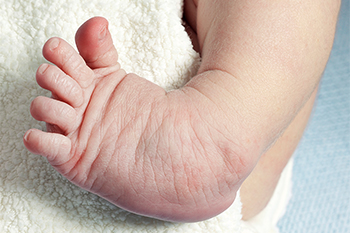Clubfoot Is a Congenital Foot Deformity
Tuesday, 03 October 2023 00:00
Clubfoot is a congenital foot deformity that affects thousands of newborns worldwide. This condition is characterized by an abnormal positioning of the foot, where it turns inward and downward, making it appear like the sole is turned upward. While the exact cause of clubfoot is still not entirely understood, it is believed to result from a combination of genetic and environmental factors during fetal development. Typically, clubfoot can be detected shortly after birth. Early diagnosis and intervention are essential for effective treatment. The goal of treatment is to correct the foot's positioning and allow for normal growth and development. This often involves a series of gentle manipulations, casting, and sometimes minor surgery. With early and appropriate medical care, most children born with clubfoot can lead normal, active lives. Regular follow-ups may be necessary to monitor the foot's growth and function, but the prognosis for those with clubfoot is generally positive. The key is prompt identification and intervention to ensure a healthy and active future for affected children. If your child has been born with clubfoot, it is strongly suggested that you are under the care of a podiatrist who can begin the necessary treatment methods.
Congenital foot problems require immediate attention to avoid future complications. If you have any concerns, contact Dr. Steven Schwartz of Pennsylvania. Our doctor can provide the care you need to keep you pain-free and on your feet.
Congenital foot problems are deformities affecting the feet, toes, and/or ankles that children are born with. Some of these conditions have a genetic cause while others just happen. Some specific foot ailments that children may be born with include clubfeet, polydactyly/macrodactyly, and cleft foot. There are several other foot anomalies that can occur congenitally. What all of these conditions have in common is that a child may experience difficulty walking or performing everyday activities, as well as trouble finding footwear that fits their foot deformity. Some of these conditions are more serious than others. Consulting with a podiatrist as early as possible will help in properly diagnosing a child’s foot condition while getting the necessary treatment underway.
What are Causes of Congenital Foot Problem?
A congenital foot problem is one that happens to a child at birth. These conditions can be caused by a genetic predisposition, developmental or positional abnormalities during gestation, or with no known cause.
What are Symptoms of Congenital Foot Problems?
Symptoms vary by the congenital condition. Symptoms may consist of the following:
- Clubfoot, where tendons are shortened, bones are shaped differently, and the Achilles tendon is tight, causing the foot to point in and down. It is also possible for the soles of the feet to face each other.
- Polydactyly, which usually consists of a nubbin or small lump of tissue without a bone, a toe that is partially formed but has no joints, or an extra toe.
- Vertical talus, where the talus bone forms in the wrong position causing other bones in the foot to line up improperly, the front of the foot to point up, and the bottom of the foot to stiffen, with no arch, and to curve out.
- Tarsal coalition, when there is an abnormal connection of two or more bones in the foot leading to severe, rigid flatfoot.
- Cleft foot, where there are missing toes, a V-shaped cleft, and other anatomical differences.
- Macrodactyly, when the toes are abnormally large due to overgrowth of the underlying bone or soft tissue.
Treatment and Prevention
While there is nothing one can do to prevent congenital foot problems, raising awareness and receiving neonatal screenings are important. Early detection by taking your child to a podiatrist leads to the best outcome possible.
If you have any questions please feel free to contact our offices located in Chambersburg, and Mcconnellsburg, PA . We offer the newest diagnostic tools and technology to treat your foot and ankle needs.

